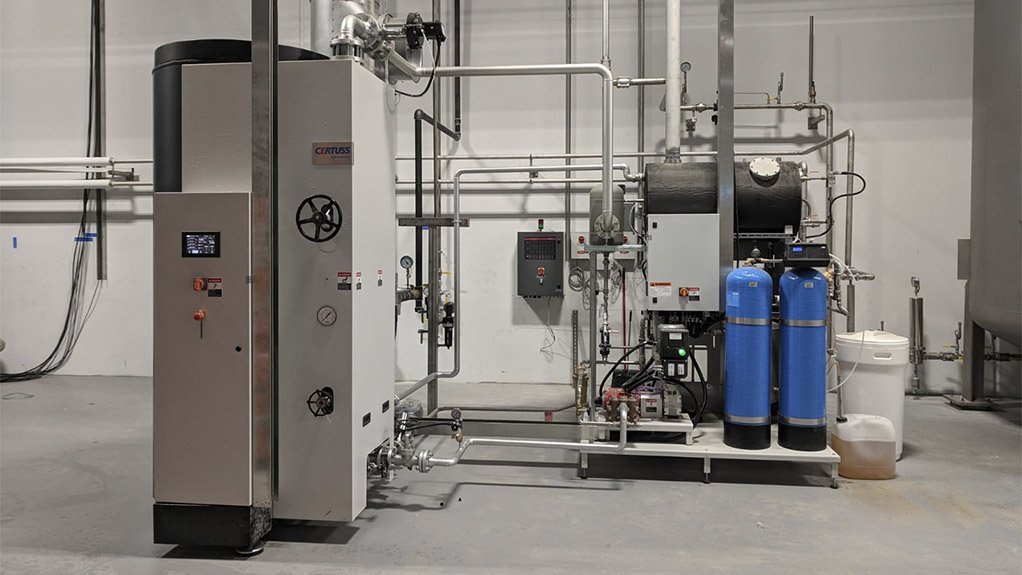Boiler and steam generator supplier Steam Generation Africa’s work and partnership with German industrial equipment supplier CERTUSS has resulted in numerous projects and opportunities in light of the African market demanding modular steam supply solutions, says MD John Rundle.
“Late last year we commissioned CERTUSS Steam Generators in both Monrovia, Liberia, and Cameroon. Both projects were installations for KHS Germany. We also completed the supply, installation and commissioning of CERTUSS steam generators for Accra Breweries in Ghana in 2021. Moreover, we’re currently working on commissioning a steam generator for East Africa Breweries in Kenya.”
Rundle notes that, while the steam generator is not new technology, CERTUSS brings a high-tech solution that provides a “modular steam supply”.
Having signed as an agency for CERTUSS steam generators at the end of 2021, Steam Generation’s first installation was for eight 2 000 kg/h steam generators installed at Accra Breweries to supply a steam-on-demand solution for the client.
“So, if there’s a maximum steam demand of 16 000 kg/h, then all eight of the 2 000 kg/h units would be running. If the plant then experiences a decrease in steam demand, to say 4 000 kg/h, then only two of the eight steam generators would be running.”
He asserts that “efficiency means nothing more than what is needed” and CERTUSS technology enables a highly flexible steam supply while saving energy. With the integrated diagnostic system, steam production is ideally distributed between the baseload boiler and the peak load boiler. This enables an orientated operation with a long service life, which, in turn, improves overall sustainability.
Moreover, it results in an extremely high degree of efficiency of up to 98.5%, when installing an economiser, adds Rundle.
“In the past, a coil-type steam generator used to result in a lot of water in the steam lines, but the technology from CERTUSS is such that no water passes into the steam line at all.” This is a significant cost saving as “it’s quite costly to remove water from the steam line”.
Meanwhile, the short heating time ensures full steam within three to five minutes. The steam generators also only operate with light oil, gas and electricity, which is key from an emissions standpoint and thus, from an environmental, social, and corporate governance (ESG) standpoint.
Rundle comments that it is possible that some of the demand for steam generators over traditional boilers might be a consequence of the current global focus on ESG, but believes the key factor is, in fact, the need to reduce energy costs.
“The technology is being developed and improved so that the cost of energy can be brought down. In any operation, I think energy is the most critical factor in production. So what they’re trying to do is reduce that cost and simultaneously enable better efficiency.”
Further, commenting on the suggestion that this might be beneficial to beverage and pharmaceutical companies in particular, Rundle clarifies that it is all about the application. “Every beverage company has different steam requirements, but I think this solution works well, regardless.”
Citing the Accra Brewery example, he notes that the peak consumption of 16 000 kg/h is only required during a couple of hours of a normal day shift and the rest of the time the brewery steam requirements can drop as low as 2 000 kg/h.
“If it used a fire tube boiler in that situation, it would be producing 16 000 kg of steam all the time. Yes, the burner will modulate down to as low as it can, but at the end of the day, it’s using a lot more energy.”
Rundle adds that Steam Generation is also an agent for UK boiler manufacturer Cochran and has been since 2014. He comments that Cochran produces fire tube boilers and stresses that there is no real competition or corporate cannibalism between Steam Generation’s two main brands because they meet two different client needs.
“The steam generator is ideal for variable steam demand, but where a factory has a very baseline steam demand, then the fire tube is your best bet.”
He suggests that being able to offer solutions from both brands is beneficial because the company can provide the correct technology and solution based on the client’s specific demands and requirements.
Expansionist View
Rundle notes that Steam Generation, as an agency is “in the throes of stocking supplies and spare parts” for all existing units in Africa.
“We’re looking to manage the dissemination of spares from South Africa.”
The company also invested in training two of its technicians at the CERTUSS factory in Germany.
Rundle comments that Steam Generation’s activity north of the border is integral to the company’s survival and sustainability.
“I think South Africa is under a lot of pressure and I think the economic growth is near zero. I believe that if one wants to only do work in South Africa, it’s going to be very difficult to survive.
“It’s critical for us to work in those countries where there is growth and investment happening.”
He comments that, for the remainder of the year, the company will look to “really push” beyond local borders.
“I think our expansion into Africa will help us through 2023/2024.”
He is also hopeful that the touting of gas as a transition fuel might be more than just hype, as the connotations for the boilers industry are positive.
“If the infrastructure is built and the gas network increases as hoped, the demand for gas-fired boilers and steam generators will also pick up. I think the pressure to reduce the overall environmental impact is there, and so I think it’s a one-to-one growth ratio, if the supply and the network to industrial areas is increased.”
Edited by: Creamer Media Reporter
EMAIL THIS ARTICLE SAVE THIS ARTICLE
ARTICLE ENQUIRY
To subscribe email subscriptions@creamermedia.co.za or click here
To advertise email advertising@creamermedia.co.za or click here













